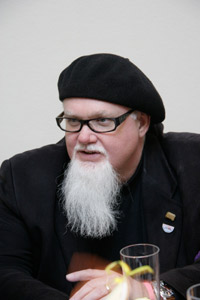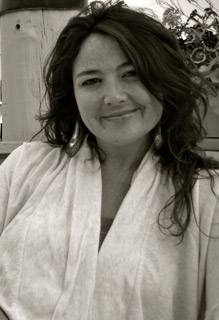Longtime P&W-supported sponsor and writer M. L. Liebler, author of fourteen books of poetry including The Moon A Box, which received the 2005 Patterson Poetry Award of Excellence, blogs about his monthly workshop at St. Clair Shores Library in St. Clair Shores, Michigan.
They all gathered, once again, as they have on the third Wednesday of the month for the past twenty-one years. Students, mothers, senior citizens, retired politicians, teachers, librarians, real estate agents, retired cops, and the occasional visitor who heard about us and wanted to “check us out.” Last night’s visitor was a fellow named Skippy, a retired Navy man from Connecticut who was so impressed with the quality of the work he heard and read that he politely asked if he could publish some of it in his church paper back home.
 I love these folks. I have met monthly with them as a small way of giving back to the community where I was raised and still proudly live. In fact, I live in the same house that my wife grew up in, and where I walked to every night while dating her when we were fifteen-year-olds.
I love these folks. I have met monthly with them as a small way of giving back to the community where I was raised and still proudly live. In fact, I live in the same house that my wife grew up in, and where I walked to every night while dating her when we were fifteen-year-olds.
Last night we heard and workshopped wonderful poems by the former County Commissioner who lamented the destruction of the ecology of America by contrasting it with the beauty of Spain’s wide-open spaces and well-kept urban areas. After this piece, a widow read her satirical poem about a suburban man who lives his life in a rush and doesn’t realize the beauty around him.
Another cool, outside the box, poem was a wonderfully rich work entitled "The Ascetic Life" by a retired librarian who explored the contemplative life of a “Holy Fool.” A young teenager read a poem that was written to get “something off [her] chest.” It was a poem about how her younger sister has continually belittled her and put her down her entire life. The poem was her empowering response that she “wasn’t going to take it anymore.” The poem received cheers from the seniors and an “I know exactly what you mean” acknowledgement from another teen in attendance.
 The evening concluded with another moving poem from one of our newer regulars, an eight-six-year-old widower who never wrote a poem in his life until he joined our group. He wrote about frequently waking up thinking there were “a lot of people in [his] house,” only to realize that he was alone.
The evening concluded with another moving poem from one of our newer regulars, an eight-six-year-old widower who never wrote a poem in his life until he joined our group. He wrote about frequently waking up thinking there were “a lot of people in [his] house,” only to realize that he was alone.
To quote Walt Whitman, “Have you ever felt so good to get at the heart of poem?” These people, young and old, are doing just that, and the great majority of them have never written a poem in their lives until now. I am grateful and honored to spend time with this diverse and welcoming group of poets. For me, this is where the real poetry in America lives!
Photos: (Top) M. L. Liebler. (Bottom) M. L. Liebler with workshop participants. Credit: Pamela Liebler.
Support for Readings/Workshops events in Detroit, is provided by an endowment established with generous contributions from the Poets & Writers Board of Directors and others. Additional support comes from the Friends of Poets & Writers.





 I love these folks. I have met monthly with them as a small way of giving back to the community where I was raised and still proudly live. In fact, I live in the same house that my wife grew up in, and where I walked to every night while dating her when we were fifteen-year-olds.
I love these folks. I have met monthly with them as a small way of giving back to the community where I was raised and still proudly live. In fact, I live in the same house that my wife grew up in, and where I walked to every night while dating her when we were fifteen-year-olds. The evening concluded with another moving poem from one of our newer regulars, an eight-six-year-old widower who never wrote a poem in his life until he joined our group. He wrote about frequently waking up thinking there were “a lot of people in [his] house,” only to realize that he was alone.
The evening concluded with another moving poem from one of our newer regulars, an eight-six-year-old widower who never wrote a poem in his life until he joined our group. He wrote about frequently waking up thinking there were “a lot of people in [his] house,” only to realize that he was alone. What techniques do you employ to help writers open up?
What techniques do you employ to help writers open up?